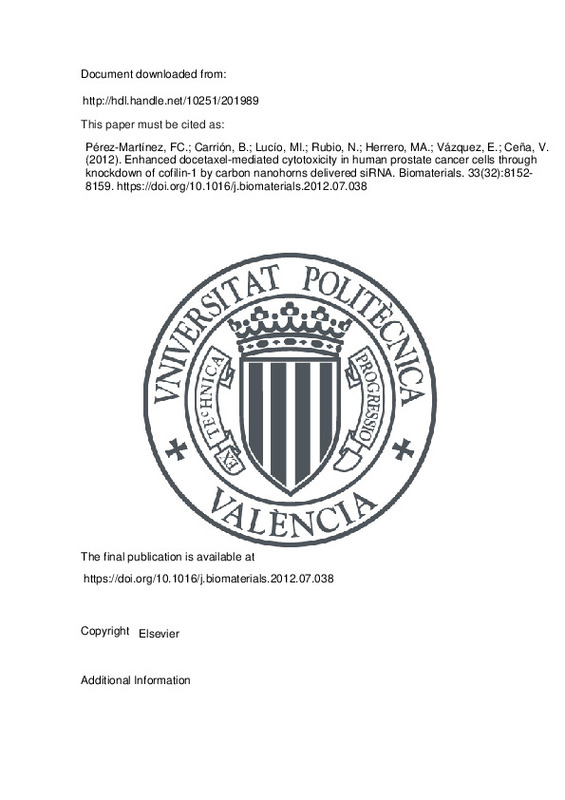Pérez-Martínez, FC.; Carrión, B.; Lucío, MI.; Rubio, N.; Herrero, MA.; Vázquez, E.; Ceña, V. (2012). Enhanced docetaxel-mediated cytotoxicity in human prostate cancer cells through knockdown of cofilin-1 by carbon nanohorns delivered siRNA. Biomaterials. 33(32):8152-8159. https://doi.org/10.1016/j.biomaterials.2012.07.038
Por favor, use este identificador para citar o enlazar este ítem: http://hdl.handle.net/10251/201989
|
Título:
|
Enhanced docetaxel-mediated cytotoxicity in human prostate cancer cells through knockdown of cofilin-1 by carbon nanohorns delivered siRNA.
|
|
Autor:
|
Pérez-Martínez, Francisco C.
Carrión, Blanca

 Lucío, María Isabel
Rubio, Noelia
Herrero, Maria A.
Vázquez, Ester
Ceña, Valentín
Lucío, María Isabel
Rubio, Noelia
Herrero, Maria A.
Vázquez, Ester
Ceña, Valentín
|
|
Entidad UPV:
|
Universitat Politècnica de València. Escuela Técnica Superior de Ingeniería Agronómica y del Medio Natural - Escola Tècnica Superior d'Enginyeria Agronòmica i del Medi Natural
|
|
Fecha difusión:
|
|
|
Resumen:
|
[EN] We synthesized a non-viral delivery system (f-CNH3) for small interfering RNA (siRNA) by anchoring a fourth-generation polyamidoamine dendrimer (G4-PAMAM) to carbon nanohorns (CNHs). Using this new compound, we delivered ...[+]
[EN] We synthesized a non-viral delivery system (f-CNH3) for small interfering RNA (siRNA) by anchoring a fourth-generation polyamidoamine dendrimer (G4-PAMAM) to carbon nanohorns (CNHs). Using this new compound, we delivered a specific siRNA designed to knockdown cofilin-1, a key protein in the regulation of cellular cytoskeleton, to human prostate cancer (PCa) cells. The carbon nanohorn (CNH) derivative was able to bind siRNA and release it in the presence of an excess of the polyanion heparin. Moreover, this hybrid nanomaterial protected the siRNA from RNAse-mediated degradation. Synthetic siRNA delivered to PCa cells by f-CNH3 decreased the cofilin-1 mRNA and protein levels to about 20% of control values. Docetaxel, the drug of choice for the treatment of PCa, produced a concentration-dependent activation of caspase-3, an increase in cell death assessed by lactate dehydrogenase release to the culture medium, cell cycle arrest and inhibition of tumor cell proliferation. All of these toxic effects were potentiated when cofilin-1 was down regulated in these cells by a siRNA delivered by the nanoparticle. This suggests that knocking down certain proteins involved in cancer cell survival and/or proliferation may potentiate the cytotoxic actions of anticancer drugs and it might be a new therapeutic approach to treat tumors.
[-]
|
|
Palabras clave:
|
Dendrimer
,
Gene therapy
,
Nanoparticle
,
SiRNA
,
Prostate cancer
|
|
Derechos de uso:
|
Reconocimiento - No comercial - Sin obra derivada (by-nc-nd)
|
|
Fuente:
|
Biomaterials. (issn:
0142-9612
)
|
|
DOI:
|
10.1016/j.biomaterials.2012.07.038
|
|
Editorial:
|
Elsevier
|
|
Versión del editor:
|
https://doi.org/10.1016/j.biomaterials.2012.07.038
|
|
Código del Proyecto:
|
info:eu-repo/grantAgreement/JCCM//PII1I09-0163-4002/ES/Papel De La Proteína P53 En La Activación Mitocondrial Durante Los Procesos Excitotóxicos/
info:eu-repo/grantAgreement/JCCM//POII10-0274-3182/ES/Dendrímeros como base de la terapia génica en la terapéutica de la osteopenia asociada a la diabetes mellitus/
info:eu-repo/grantAgreement/MICINN//BFU2011-30161-C02-01/ES/NANOPARTICULAS NO VIRALES COMO VECTORES PARA SIRNA EN CELULAS TUMORALES Y NEURONAS/
|
|
Agradecimientos:
|
F.C.P-M. and B.C. are recipients of Torres Quevedo contracts from Ministerio de Ciencia e Innovacion (Spain) and NanoDrugs, S.L. This work has been supported, in part, by grants BFU2011-30161-C02-01 from Ministerio de ...[+]
F.C.P-M. and B.C. are recipients of Torres Quevedo contracts from Ministerio de Ciencia e Innovacion (Spain) and NanoDrugs, S.L. This work has been supported, in part, by grants BFU2011-30161-C02-01 from Ministerio de Ciencia e Innovacion; PII1I09-0163-4002 and POII10-0274-3182 from Consejeria de Educacion, JCCM to V.C.
[-]
|
|
Tipo:
|
Artículo
|







![[Cerrado]](/themes/UPV/images/candado.png)


